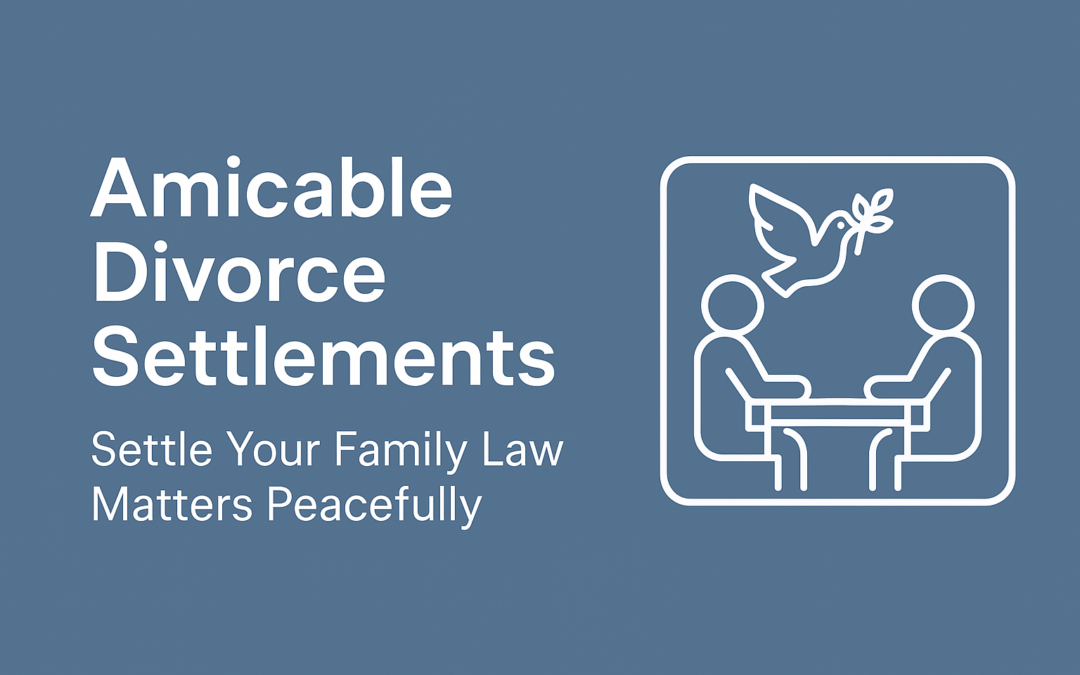Amicable Divorce Settlements – giving you the power to settle things your way
Divorces and family disputes are tough, and traditional legal battles only make them worse. Amicable family law offers a better way to find fair solutions that are tailored to your needs and can be made legally binding.
There can be such a thing as a ‘good’ divorce, where you can avoid the high costs, stress, and powerlessness associated with the court system and traditional processes that threaten litigation around every corner. Our amicable divorce lawyers can guide you and your former partner towards outcomes that are fair and aligned with the best interests of you and your family.
What is Meant by an ‘Amicable’ Family Law Settlement?
An ‘amicable’ situation involves civil interaction between parties, despite difficult circumstances. No doubt separation and divorce pose very difficult circumstances, and while you may no longer see eye to eye with your former partner, there are better ways to resolve your family law issues than through adversarial processes.
An amicable family law settlement is one reached by former partners without the intervention of a court or through antiquated battles between the parties and their legal representatives. Amicable family law fosters open communications between the parties in a non-confrontational setting. Disputes may be resolved through negotiation, mediation or collaborative law. These processes are typically faster and less expensive than traditional ways, helping preserve relationships and prioritising the emotional and financial well-being of the family unit.
What Are the Benefits of an Amicable Family Law Settlement?
Opting for an amicable settlement offers a range of benefits.
Faster, Less Expensive Resolutions
Litigation is protracted and can be incredibly expensive. Legal fees, court costs, expert witness fees – they all add up quickly. And court proceedings can drag on for years. By avoiding litigation, you can significantly reduce the time and costs to resolve your family law matter, help preserve your financial resources and rebuild your life sooner.
Less Emotional Distress
Family law disputes are inherently stressful. Litigation often amplifies this stress, creating anxiety, resentment, and lasting emotional scars, especially for children. An amicable family law settlement fosters a more respectful and cooperative environment, minimising conflict and promoting healing.
Greater Control Over Outcomes
In court, a judge makes decisions that may not necessarily align with your specific circumstances or priorities. By cooperating and exploring ways to deal with issues after separation or divorce, you can develop solutions tailored to your unique needs and the best interests of your family. You retain control over the outcome, not a judge.
Preservation of Relationships
Although the aim is not to repair the relationship, amicable settlements can help maintain a more respectful and cooperative dynamic, particularly crucial for those navigating co-parenting after separation. This fosters a healthier environment for children and allows for more constructive communication in the future.
Increased Privacy
Court hearings are typically public and can expose sensitive personal information to scrutiny. Amicable settlements are confidential, protecting your privacy and keeping your family matters out of the public record.
Improved Communication
The process of negotiating an amicable settlement can foster better communication skills, which can be invaluable for future interactions and co-parenting.
Focus on Children’s Well-being
Perhaps the most important benefit is the focus on the children’s well-being. Amicable family law settlements prioritise the needs and best interests of children, minimising their exposure to conflict and promoting a more stable and supportive environment.
How Can I Reach an Amicable Family Law Settlement?
Amicable family law involves former partners exploring and finding solutions to their issues, often with help from an impartial third party with skill and expertise in negotiation, mediation and family law. Different dispute resolution methods can facilitate this process.
Negotiation: Parties and their lawyers directly negotiate with each other to reach an agreement.
Mediation: A neutral third party (mediator) helps both parties communicate and negotiate a mutually acceptable agreement with the help of their family lawyers.
Collaborative Law: Each party is represented by a specially trained collaborative lawyer who focuses on reaching a settlement outside of court.
We’ve Already Reached an Agreement – What Now?
If you and your former partner have already negotiated an amicable family law settlement, we can help you make the arrangements legally binding through consent orders.
Consent orders are enforceable orders approved by the Federal Circuit and Family Court of Australia. They can cover a range of family law issues including the division of your property and arrangements for your children. We’ll draft the appropriate orders to ensure they accurately reflect your agreement and file them with the court for approval.
A Final Word on Amicable Family Law Settlements
The emotional and financial toll of a protracted legal battle can be significant, and going through a separation is challenging enough without antagonistic ploys and threats of litigation. An amicable family law settlement offers a path towards a resolution that prioritises cooperation, minimises conflict, and empowers you to shape your future.
Leda Lawyers is a dynamic and experienced team with the primary focus on helping clients navigate some of their most challenging moments with dignity, clarity and finality.
For a more practical and less confrontational way to resolve your family law issues, contact Leda Lawyers, your amicable divorce lawyers.

